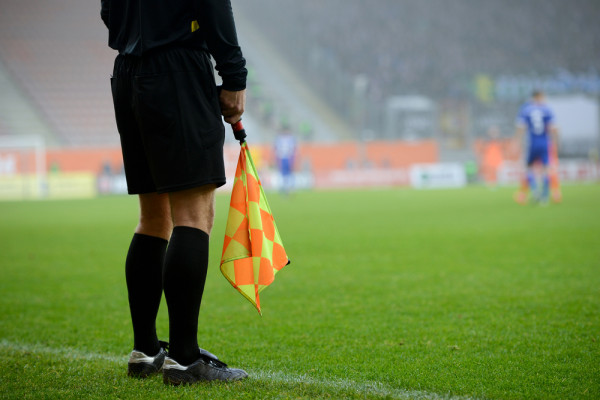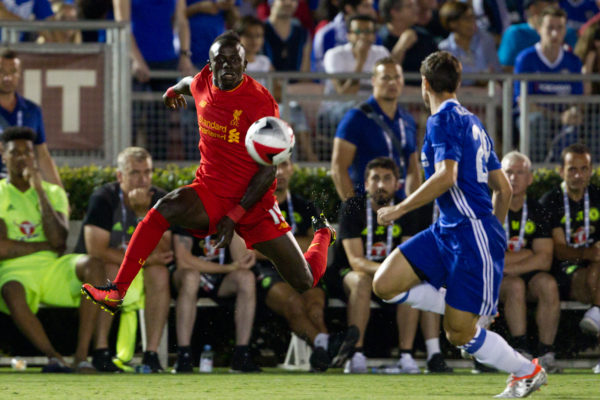Football’s evolution has long moved at a glacial pace. It is a sport stuck in the past and terrified of moving with the times, though quite why that’s the case I’m not entirely sure. Every single major sport in the world has adopted technology at every opportunity, up to and including snooker and the ability for the referee to use television to ensure that the balls are replaced in the correct position if a player wants their opponent to re-take a shot. When football has adopted some form of technology, from HawkEye saying whether the ball has crossed the line through to assistant referees being able to talk to the match referee via headphones, it has been resisted but eventually become a seamless part of the game. In recent times the conversation around technology has involved conversations about one thing more than any other – the Video Assistant Referee. It has become something of a partisan issue, with those against resolutely refusing to accept that it might add something to the game and those in favour of it absolutely convinced that it is the way forward. There seem to be very few people sat on the fence, waiting to see how it pans out.
Football’s lawmakers approve video assistant referee technology (VAR) for this year’s FIFA World Cup https://t.co/cHZUuA2rJr pic.twitter.com/6Ta6IsQTom
— AJE Sport (@AJE_Sport) March 4, 2018
I am a big fan of VAR. I think it will level the playing field moving forward and remove the ability for referees to have too much of an influence on the outcome of a football match. I absolutely understand some of the criticisms of it and arguments against it at this point in its shelf-life, yet I also can’t help noticing that barely a match goes by any more without a major decision causing some aspect of controversy. Those that are against the introduction of the Video Assistant Referee say that we just need to ‘train referees better’, but I can’t help feeling that that misses the point entirely. I don’t think the Football Association are willingly under-training their match officials and I imagine that if you spoke to the Managing Director of the PGMOL, Mike Riley, he’d say that the Professional Game Match Officials Limited is immensely happy with the standard of refereeing in the country. After all, they declare that ‘There is a robust system for measuring Select Group performance over the season’. It’s not as simple as just ‘training them better’, then. VAR looks as though it’s the way forward, so I decided to have a look at why.
The Video Assistant Referee System Isn’t Perfect
Those that dislike the use of VAR attack those that do as if we think it’s absolutely perfect. That is categorically not the case. I realise that, in its current form, it is far from perfect. In fact, I’m concerned that there might be a rush to introduce it too quickly. I understand that it needs to be tested at the highest level, but I’ve seen people such as my good friend Robbie Scotcher say that it should be given a season and if it doesn’t work we get rid, which concerns me. If it’s introduced before it’s properly ready and the overall opinion is that it’s failed and we should get rid of it, calls to bring it back will be met with cries of ‘we tried it once and it was terrible’. The reality is that the end result of decision making has been correct the vast majority of the time that we’ve seen it used so far, but it’s the manner of its use that’s causing problems.
Hot take: VAR stands for “video assistant referee” meaning that – just like the regular assistant referees (the people running along the sideline with flags) – they are there to ASSIST THE REFEREE.
— Anthony (@_ascarcella) March 10, 2018
In my opinion, it absolutely needs to be quicker. There will be times when the game is slowed down as a result of using the system, but that’s no different from at the moment when a referee will consult his assistants and can end up speaking with them for a decent chunk of time. Take Liverpool’s draw with Spurs at Anfield this season, for example. Jon Moss spoke for ages with his assistant and then went on to incorrectly award the visiting team a penalty anyway. There’s no doubt in my mind that that decision would have been made far more quickly, and far more correctly, if Moss had been able to consult a video replay. Personally I would give the Video Assistant Referee autonomy over tight decisions. The role will be fulfilled by a referee trained to the same standard as the man in the middle after all, so why can’t their judgement be trusted? That would speed things up immeasurably.

There also needs to be far more communication between the officials and the supporters in the stand. From what I understand about the way that video replays work in rugby, the conversation between the match referee and the Video Assistant Referee is broadcast over the Public Address system, allowing those that have paid money to attend the game to know exactly what’s being considered. I think this would work wonders in football, keeping the crowd in the loop and adding a degree of excitement to the game. Yet I don’t think the Football Association will consider doing it even for a minute, for one simple reason – they don’t want officials to have to explain themselves. Which brings me neatly to one of the main reasons I think we desperately need technology to become an integrated part of the game…
There Are Rarely Consequences For A Poor Refereeing Performance
One of my biggest issues with the Football Association and refereeing in general is that those in charge of football matches almost never have to face up to any consequences over poor refereeing. If they’re absolutely dreadful and do something ridiculous that causes a national storm then they might be moved down to referee the Championship for a fortnight or something, but they’ll be back in the Premier League soon enough. It’s the low-key poor refereeing performances that wind me up, with a clear example from last weekend’s game at Old Trafford ripe for us to talk about. I don’t think Craig Pawson is biased against Liverpool, nor do I think there’s any sort of overwhelming refereeing conspiracy that we’re the victims of. I do, however, think some referees are quick to referee narratives within a game rather than just referee according to the rules.
Soon as I saw this I knew we’d get nothing out of the ref. Genuinely terrible performance, to the point where you can understand why people might be suspicious about it. #LFC https://t.co/XzIy8fcyRq
— And Could He Play (@andcouldheplay7) March 11, 2018
As soon as Pawson gave a free-kick against Emre Can, despite the fact that the German won the ball, I knew that we wouldn’t get anything out of him for the rest of the match. He made low-key errors like that throughout the game, though critics of VAR would be quick to point out that the video review system won’t help with those sorts of incidents. That’s absolutely true, but my counter argument would be that low-key decisions don’t decide matches. Yes they’re frustrating and they can break up a team’s flow, but they’re not as influential as when a penalty or sending off are missed, both of which were the case at Old Trafford and both of which the Video Assistant Referee would have picked up on.

Photo-Works / Bigstock.com
This is not merely me taking a chance to complain about the refereeing of the game against Manchester United, but rather picking an issue that is fresh in everyone’s minds to make a point. Liverpool went into the game against our fiercest rivals believing that we had a chance to win and move to second, but instead we lost the match and now sit in fourth heading in to the next set of fixtures. I genuinely believe that if VAR had been being used at the weekend then we would have at least left Old Trafford with a draw, which would have made the closing stages of the league far more interesting. You can say we didn’t create enough chances, but it’s difficult to do that when your strikers are being fouled in the box, players are handling the ball and karate kicking your forwards with impunity.
This Liverpool V United game screams “Video Assistant Referee” because people like Craig Pawson would be exposed. It’s the same for the Chelsea V United with that ONSIDE equaliser by Morata. No more poor decisions at Old Trafford it’s only been nearly three decades!
— Monkey D. Luffy (@StrawHatShounen) March 10, 2018
Pawson would likely still have been influenced by the occasion and the home crowd for the little decisions, but VAR would have stopped him ignoring the big ones. Yet he won’t be dropped from the refereeing roster or even given extra training or the like. Which is a big part of why I think Video Assistant Referees will be so important moving forward. If referees can have a terrible game, even in a low-key sense, but then carry on as normal then what’s the point in pretending we don’t need technology to help them out? It would be a lot easier to say ‘leave them be’ if there was any sense of accountability. Instead, the Football Association just buries its head and carries on as normal, leaving the rest of us to pull our hair out.
Don’t Like VAR? Don’t Complain
In my opinion, the majority of arguments against VAR are very weak. Things like ‘it slows the game down’ or ‘you can’t celebrate a goal’ are far too flimsy to deny the introduction of something that will allow referees to get decisions correct far more regularly. More than anything else, though, I strongly believe that if you don’t think we should bring the video review system in then you shouldn’t be complaining about refereeing decisions that don’t go your team’s way. If you’re actively saying that the officials shouldn’t be given help that exists and is relatively easy to implement then you’re essentially saying that you accept that humans will get it wrong every now and again. With that being the case, it’s hypocritical to then complain when they do exactly that. Saying ‘they shouldn’t be getting that wrong’ is all well and good, but they do. We know they do and they’ll continue to. VAR isn’t perfect, but it’s as close as we’re likely to get.



